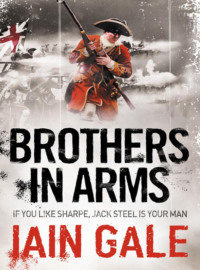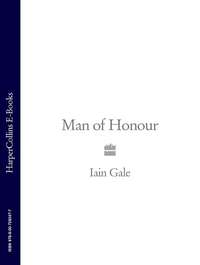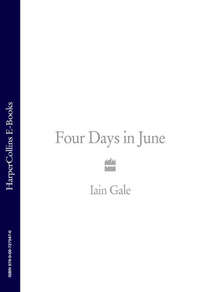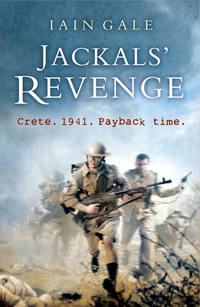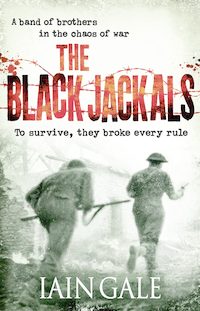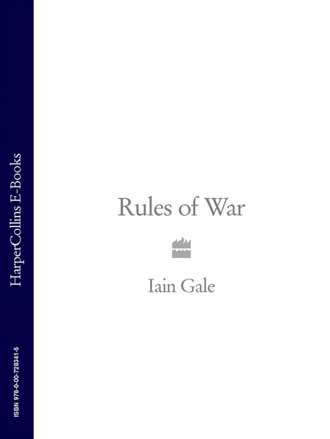
Полная версия
Rules of War
‘Are we winning then, sir?’
‘Now, Jack, I would be a foolish man to say that, wouldn’t I? While you were up here taking this village, down there on the plain there has been a great cavalry battle. General Overkirk has turned the French horse. Now though comes the real crisis. If this next manoeuvre goes according to the duke’s plan then I do believe that very soon we might well be the victors. It’s as well that I found you, Jack, although you’d have got it by hand of an orderly just as well. The Guards are to remain here in the village until the last, to cover the withdrawal. You and the other companies of all the brigade’s Grenadiers under Lord Orkney’s command are needed forthwith in the centre where we intend to make a grand assault. Take your company and report to the Dutch. I’ll see Colonel Farquharson. You will be seconded to a Major van Cutzem of the Dutch infantry.’
‘You come here merely to deliver orders? Colonel Hawkins, I know you better than that.’
‘Indeed you do, Jack, and you are quite right. I have you in mind for a particular purpose. I can say no more of it as yet. I had not seen you for a fortnight and simply wanted to make sure that you still lived. Keep yourself safe this day, Jack, I shall have need of you ere long.’
Orkney had left to rejoin his staff and as Cadogan mounted up and Hawkins went to join him, he cast a glance back over his shoulder. ‘Oh, and Jack, I forgot to wish you good luck. Though it always seems to run with you.’
Steel smiled and nodded. Even as the French battery continued to fire, the shot coming in just above their heads and crashing into the walls of the surrounding houses, he strode across to where Slaughter and the men still stood at attention.
‘Stand down, Sarn’t.’
Hansam approached him, eager-eyed: ‘So, do we attack?’
Steel stared at the ground, and drew with his sword in the dirt. ‘No. We’re moving out.’
Slaughter spoke up: ‘After the French already, sir. Is the battle won then?’
‘Not exactly, Jacob. We’re to move backwards and to the left – not forward. We are to withdraw and proceed to the centre.’
Hansam shook his head, laughed and reached for his snuff box.
The sergeant spoke in disbelief: ‘What, after taking the village and climbing up that bloody hill? And with all those men dead?’
‘Those are our orders. We are seconded to a Dutch battalion. I’d take it as an honour if I were you, Sarn’t.’
Steel could see the logic in Marlborough’s strategy, although he could not condone the decision not to vouchsafe the plan to Orkney, and he sympathized with the general’s indignation. If you were to mount a convincing feint upon the enemy’s flank intended to draw out his reserves, what better way to do it than persuade your own men that it was in earnest? It was not fair – but then, thought Steel, what was fair in this new warfare in which every fight brought some new surprise. As much had been plain to him in Bavaria before Blenheim, and since then he had seen time and again evidence of a changing attitude which directed their actions in every theatre of the present conflict, from Flanders down to Spain and Portugal.
He stopped drawing maps in the dirt and looked up: ‘Move the men out, Sarn’t. Column of threes. And try to keep the files at a little distance. We don’t want to present too good a target to the French gunners.’
Slaughter, still seething at the inexplicable order to move back, took out his fury on the Grenadiers. ‘You heard the officer. Marching formation in threes. And look sharp about it. You there, Sullivan. Get in step, damn your eyes! I said move.’ To emphasize the need for haste he prodded another particularly slow Grenadier, whose stature made up for his lack of wit, with the haft of his halberd. ‘Come on Milligan, you lump of lard. We don’t want you to be late for the next dance, do we? Let’s give the Frenchies back their village now. Quick as you can, lads. Mustn’t keep ’em waiting.’
They marched off to the left and down a narrow street and out of the village, slightly to the south and west of the way they had come up, but still close enough to see the limp red mounds which were the bodies of their fallen comrades. Slaughter noticed the nervous glances cast towards the dead: ‘Eyes front now. Pick up the pace there, Tarling. The Frenchies won’t wait all day for us. You don’t want a bayonet up your arse, do you?’
As they made their way down the slope and towards the centre of the allied line Steel realized that they were marching in a dip in the ground and thus quite invisible to the enemy, even positioned as they were on the higher ground. There was no way in fact that the French could possibly know that Marlborough was moving the right wing into the centre or what he intended. Casting a glance to his left, up to the British lines, Steel saw that the regimental colours of every battalion in Orkney’s brigade were still in place with their escort on the ridge-line. On Marlborough’s instruction a token force had been left there quite deliberately so that to the untutored eye what remained on the crest would present the appearance of several battalions in close order. He realized too that it was quite brilliant. Steel knew in that moment that his confidence in the duke had not been misplaced and he knew too that soon Orkney would understand. Within minutes the duke would have a huge advantage of numbers in the centre of the battlefield. And then they would see what happened.
Ahead of them now Steel could see the flank of a Dutch battalion, blue-coated and poker-straight, standing quite still, despite the withering fire from the French cannon on the rising ground to their left. Steel spotted the officer and waved the men on.
Major Henk van Cutzem was very nearly Steel’s equal in height, with a shock of long blond hair which he wore tied back like Steel, although in his case such was its volume that most of those who did not know him took it for a full wig. He wore a slim, fair moustache and beneath it for an instant, Steel fancied that he caught the faintest shadow of a smile. He nodded in greeting.
‘Captain Steel?’ The Dutchman’s English was impeccable.
‘Major.’
‘Welcome. You may fall your men in on the right of our line.’
Steel bowed: ‘You do me an honour, Major. My thanks. But I should not like to unsettle your own Grenadiers.’
‘On the contrary, Captain Steel. The honour is ours. You come with a reputation. You are a hero, a veritable Achilles. They say that at Blenheim you led your company to rescue your regiment’s standard – from the French cavalry, no less. King Louis’ own bodyguard?’
Steel nodded.
‘You led infantry against cavalry to save the colour?’
‘I led Grenadiers, Major.’
‘Quite so, Captain. But this is not within the rules of war. It goes against all logic. Why did you do it?’
‘A question of honour. Couldn’t allow the French to get away with our colour.’
‘Quite so. Honour.’ He paused. ‘Do you believe in honour, Mister Steel?’
Steel winced at being called ‘Mister’, a lieutenant’s title. He felt sure that the Dutchman had not intended it callously, but nevertheless it reminded him sharply that his captaincy, won so hard at Blenheim, still remained merely a brevet rank.
‘I believe in it with all my heart, Major. Why else do we fight save for honour? The honour of our regiment. The honour of our country and that of our monarchy. The honour, surely, of ourselves?’
Van Cutzem nodded and smiled. ‘Of course, Captain. We fight for honour. Although I of course fight also to save my homeland from the French. Speaking of whom, I believe we are about to witness an example of honour at work.’
Opposite them, before the solid rank of motionless, white-coated French infantry, stood two officers. From such a distance Steel could not tell their rank. As he and the Dutchman watched both of the Frenchmen drew their swords. With a flourish they brought up the blades in the salute before lowering them alternately to the left and to the right. Then they replaced the swords in their scabbards and gave a formal bow towards Steel and the Major in turn. Steel nodded in return and smiled and was about to say something droll to van Cutzem when to his surprise the Dutchman took a pace forward and removed his hat. Bending over in an exaggerated bow which brought his fair hair almost in contact with the ground, van Cutzem swept his hand and hat before him with a flourish and straightened up.
Steel watched him closely, smiling at the polite salute. Van Cutzem turned and rejoined Steel. He noticed the smile: ‘You find something amusing, Captain?’
‘D’you really, honestly think it helps? All that? Surely we’re here to fight them? To kill the French. Of course we give them fair quarter. But why bother with the dramatics?’
‘You don’t ever make the formal salute? Never? I am surprised, Mister Steel. If you hold honour as dear as you say, then surely this must be part of your code also?’
‘I don’t believe in bowing to the enemy, Major. I’d sooner lick their boots.’
‘Then it is pride which you hold dear, not honour.’
Steel laughed. ‘Pride. Honour. Don’t play word games with me, Major. I know what I’m fighting for and so do you. But if you want to continue your little charade, then don’t mind me. It’s amusing to watch, a game, if you like. But it’s not war.’
Van Cutzem stared at him and his cheeks coloured. After a few moments he spoke, staring at the ground. ‘War? Do you know what war is, Steel? I’ll tell you what war is. War is three decades of misery and terror. War is a tale of horror told at a fireside by a maimed father, to his young son. A tale punctuated by sobbing and silence. It is a tale sometimes so painful that it can never be told.’ Van Cutzem, his rage now visible in his ice-blue eyes, stared hard into Steel’s face. ‘My grandfather was killed in cold blood, in front of his children. He was stripped and tied to a cross and roasted alive while his wife was raped and then had her throat slit. The children, my own father among them, were cast out into the fields to live like animals. Happily for me my father survived, although he lost a hand in the process. His sisters did not survive. We do not know their fate. That, Captain, is what war means in these parts.’ The Dutchman spoke quietly now: ‘That, Mister Steel, is why we use these “absurd” conventions and rules. That is why it is so important to obey such rules of war. We never want to descend into that hell again. We will do anything to avoid it. Anything. And so we fight the French. But it must never again come to that.’ His bitterness subsiding, van Cutzem lowered his eyes. ‘Please God that we shall never have to witness such things again. That is why, Captain Steel.’
Steel nodded: ‘I’m sorry, Major, truly. I should have thought. Forgive me if I have offended you. It was not intended.’
Of course, he longed to tell the major that he did understand only too well what he was talking about, that he had seen such atrocities. Committed not a hundred years ago, but ten. In Sweden and Russia and again, most hauntingly in his mind, only two years ago in Bavaria. The sights which informed his dreams and woke him, sweating hard, in many a cold night. Whole populations massacred, regardless of their age and sex. A village put to the sword. Women raped, children spitted like rabbits. This was not the stuff of history or folk myth, this was happening in their time. Even, for all he knew, as they spoke. They lived in an age of war and terror. He was tempted to tell van Cutzem, but half of him realized that the man would not, did not want to believe him. Why dispel his illusions of this courtly warfare? Steel knew that world to be coming to an end, just as Marlborough had forged a new army and was rewriting the rules of engagement. So as they participated in these great events they were making a modern era. And whenever it finally happened, tomorrow or five years hence, sometime within their own life span – if they were yet spared a French bullet – the old world would soon be gone for ever. Steel would allow the major his dream of chivalry. He knew the reality. Then his gaze settled on something over to the left. For an instant Steel doubted his own vision and his reason and wondered whether van Cutzem was not after all right and perhaps the age of chivalry had returned.
THREE
Looking across to his left, past the Dutch infantry in their serried dark-blue ranks, Steel beheld a sight which left him open-mouthed. On the plain below their position, formed up in a line which stretched between the villages of Taviers and Ramillies and the huge grass-covered mass of what Hansam had lately and with some authority informed him was an ancient Celtic burial mound, lay a hundred squadrons of allied cavalry: perhaps fifteen thousand men. The sunlight glinted off their drawn sabres and flashed on polished cuirasses and harnesses. Not even as a young ensign, while serving in the northern wars between Sweden and Russia, did Steel remember having witnessed such an awesome spectacle of military might.
Van Cutzem too was staring at the cavalry: ‘Now we shall see a fight. This is why Marlborough has brought the French to battle here. This must mean victory.’
Steel watched as the horsemen began to trot into position and felt the ground start to tremble. ‘I do believe you may be right, Major. But what are we to do? Do we attack Ramillies itself? Certainly our cavalry may defeat the French, but they cannot take a position which has been so heavily fortified by the enemy. We will have won the open ground but in all truth the field will not be ours.’
Van Cutzem shook his head: ‘That may be so, Captain. But our orders are to stand. We are to wait until the cavalry have attacked. My generals believe that the day will be resolved by a cavalry battle, not by the infantry. I’m sorry. My orders and yours too, are to stand here.’
Steel put a hand to his head: ‘And be shot to shreds by the French guns?’
‘If that is what it takes. Those are my orders, Mister Steel. And I am very much afraid that at the present time, as you find yourself under my command, you must obey them also.’ A horseman cantered up to the major and the rider, a Dutch dragoon, muttered a few words of Flemish. ‘And now excuse me, please. I am summoned by my brigadier. Perhaps we shall advance after all.’
Van Cutzem took his horse from the orderly who had been holding her, mounted and rode towards the rear of his regiment. Steel bit his lip and shook his head. First they had been pulled out of a hard-won foothold and now seemed destined to be left to the mercies of the French artillery. The first decision he had understood. But the second? Sometimes he wondered whether his own commanders were fully aware of any of the many wasted opportunities offered by a battlefield. His musings were interrupted by activity to the front as a body of men approached them.
Slaughter had seen them too: ‘Grenadiers. Stand to. Charge your muskets.’
Forty weapons were levelled towards the horsemen, bayonets fixed. Steel looked at the advancing troops and as they grew closer saw with relief from the green cockade in their hats that they were of the allied side.
‘At ease, men. They’re ours.’
As the ragged column neared them he began to hear snatches of broad Scots dialect. He also saw that, whoever they were, these men had been badly mauled. This bloody mess was, it seemed, what had once been a battalion or more of redcoats. And Scottish troops at that. But under whose command were they, he wondered.
Slaughter came to his side: ‘That’s not a sight I ever like to see, sir. Unsettles the men too. Poor buggers.’
A man passed them, a junior officer, perched on a makeshift seat made from a musket carried by two of his men, one of whom was sobbing. The officer’s left leg had been sheared clean away from the bone and his calf was hanging by the thinnest of tendons. To judge from the colour of his face he had lost a great deal of blood. He said nothing but stared with glazed eyes to his front, still in deep shock. Steel wondered how he would fare when the pain finally cut in. The longer the shock, they said, the worse the agony when it came. Slaughter cursed. Evidently they had been repulsed with some force. It impressed Steel that they were not in rout, but retreating in a controlled manner, their sergeants keeping them in line despite their evident exhaustion and distress. As Steel stood watching, one man – a big fellow with an almost bald head, walking at a fast pace – pushed past him, knocking against his arm with some force. The man did not apologize but carried on.
Steel, regaining his composure, shouted after him: ‘Mind your step, sir. Have a care. Even on a field of battle we yet have manners.’
The man turned and Steel saw, even through the mud and blood which had spattered across his once-white breeches, that he was an officer. He turned and walked back towards Steel and as he did so wiped a hand across his face, removing some of the dirt which cloaked his features. ‘And who might you be, sir?’
His accent was not unlike Steel’s own; soft and with a slight Scottish burr.
‘Captain Steel. Sir James Farquharson’s Regiment of Foot. I command the Grenadiers. Who, may I ask, might want to know?’
Again the man wiped his face and stared hard at Steel: ‘D’you not know me?’
‘I was not aware that I should, sir.’
The man smiled and Steel registered his confidence: ‘Well, you certainly are aware now, Captain Steel. Argyll is my name. I command those Scots regiments in Dutch service which for the last hour have been engaged with the enemy.’ He pointed towards the village which lay in the centre of the battlefield: ‘Over there. Against Ramillies. And now, I have had enough of playing with the French. The pleasantries are finished. I intend to take it.’ He paused, then looked at Steel again: ‘You recognize me now, I’ll wager.’
Steel blustered through his embarrassment. John Campbell, Duke of Argyll. Not only was the man a general. He was a general of Scottish troops and a close friend of Sir James Farquharson, his own colonel. In fact Steel had seen Argyll several times in the past campaign in conversation with Sir James. But on those occasions he had not been dressed in quite this manner. Now he looked to all the world like the meanest junior officer.
Steel stiffened to attention: ‘I am most dreadfully sorry, My Lord. I really did not know you. Your … your appearance. Your dress. I …’
Argyll laughed: ‘I am disappointed. But in truth I suspect that were I now to look in a glass I should not know myself. I imagine that I can hardly present a noble appearance. For the present however, such things are not important. What I am concerned with is prising the village of Ramillies away from the French. And I very much fear that we must go again.’ Steel saw a thought pass over his mind. ‘Steel, yes. Jack Steel, is it not? You are the officer, are you not, who saved Sir James’s colour at Blenheim?’
For the second time in two hours Steel had to admit that the honour was indeed his.
Argyll smiled broadly and clapped him on the shoulder. ‘Then you are a brave man, Steel, and at this most pressing moment I need every brave man that I can find. Your command is where at present?’
Steel gesticulated to the Grenadiers who stood twenty paces to his rear. ‘We are detached to a Dutch command, My Lord, and await our orders to attack.’ He added: ‘Should they ever come. For the present I am commanded to stand here.’
‘Well, Captain Steel, your waiting just came to an end.’
A French cannonball, fired at an unseen target, flew past them. Steel watched as the younger Grenadiers flinched and those few remaining veterans pretended to ignore the ever-present danger. Slaughter stood leaning upon his halberd, keeping a careful watch over his charges.
Steel spoke: ‘I have my orders, sir.’
Campbell smiled at him. ‘I am your orders now, Steel. Come on, man. I’m not waiting here to die and I believe that you and I are cast in the same mould. The fight is over there, Captain Steel. You are a Scot, I perceive and Sir James Farquharson’s man, an officer of whom he speaks most highly. It’s men such as you and I that are fighting to build a new world. We are Britons, Steel, but do not forget that we are also Scots. We above all others protect the faith of our homeland. I take it, Steel, that like myself, you have never any greater wish than to see these French Papists and their Jacobite allies sent to hell?’
Steel was surprised at the passion of Argyll’s impromptu political rant. Although he did not share his bigotry, he did certainly believe in the concept of Union. Uncertain quite how to respond, he settled on diplomacy and merely nodded.
Argyll smiled: ‘I knew it. Now bring your men. We’ve a village to take.’
As the duke loped off towards his brigade, Steel turned grim-faced to Slaughter. ‘Sarn’t, it seems that we’re to attack the village. Form the men up. Battle order.’
‘You had an order then, sir? I thought that Major Cutzem wanted us to stay put.’
‘Firstly, it is my place to think, Sarn’t, not yours. Secondly, I think that we can assume that Major van Cutzem’s order simply did not reach us. Wouldn’t you say?’
Slaughter laughed: ‘Order, sir? I can’t mind any order from the major.’
‘You see. Let me do the thinking.’ Steel turned to the company: ‘Grenadiers. With me.’
Hansam walked towards him: ‘Is this wise, Jack? To disobey an order so blatantly? It is a court-martial offence.’
‘I accept full responsibility. I am the senior officer, Henry. Do not worry. You are exonerated. We must take the village. We cannot rely upon our masters to notice every ebb and flow of the situation on the ground. It seems that the duke is engaged in a great cavalry battle to our left wing. It’s up to men like you and I, Henry. You know that at the crisis it is ever not the generals but the men and the officers in the field – the captains, lieutenants and ensigns and not least the common soldier – who change the course of a battle.’
Hansam nodded: ‘Very well, Jack. But should we fail they will throw us to the dogs, for certain.’
Steel laughed and grasped his friend by both shoulders: ‘But we shall not fail, Henry, you and I. Poor Tom – that he should miss this for naught but a scratch.’
Slaughter had formed the company into the assault formation, doubling the ranks to extend the line and ensure that every man would be able to find a target when the moment came. ‘You heard the officer. Sling your fusils. Make ready your grenades.’
Instantly, sixty pairs of hands draped the thick leather slings of their weapons over right shoulders and fumbled with the straps of the big black leather bags which hung at their right hips. Each of them contained four hollow three-inch-diameter iron balls weighing some two pounds filled with gunpowder, stopped with a wooden plug and topped with a fuse of hemp dipped in saltpetre: grenades. Slaughter barked another command and the company moved to the left with Steel and Hansam at their front.
They had gone hardly twenty yards when from Steel’s left came a shout. ‘Hello! I say, wait there, Captain Steel. What are you doing? I have orders here to advance. Do not leave. You attack with us.’
Steel raised his hand and Slaughter barked the command to halt.
Major van Cutzem rode up to the head of the assault column. ‘Captain Steel. Where are you going? Have you new orders. From whom?’
‘I have, Major. Directly from Lord Argyll who commands a brigade in Dutch service. I am ordered to attack Ramillies.’
‘But Lord Argyll does not command you. I do. And I have orders to attack Ramillies – with you.’
‘I take my orders from Lord Argyll, Major.’
Van Cutzem narrowed his eyes: ‘This is an outrage. I shall complain to the highest authority. I shall have you court-martialled.’
‘Perhaps so, major. But before that I shall have taken Ramillies. And then I really don’t think that it will matter. Do you?’
The Major scowled at Steel. ‘You may assist your Lord Argyll to take the village, Captain Steel. But you will see that it will be a Dutchman to whom Ramillies falls. I shall take the village, sir. And without your assistance.’


